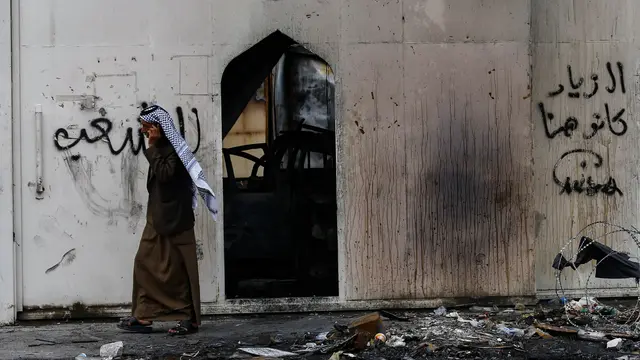Iraqi political leaders have agreed to delay appointing a new prime minister after the constitutional deadline expired in a country shaken by months of protests that have left hundreds dead.
Parliament was due to propose a candidate before midnight on Thursday to replace Adel Abdel Mahdi, who quit in November as the death toll mounted in massive demonstrations against official graft and lack of jobs.
What's happening in Iraq?
A wave of popular unrest began in Iraq on October 1. More than 450 people, mostly unarmed demonstrators but also some members of the security forces, have been killed since and around 25,000 injured.
Protesters, most of them young, are demanding an overhaul of a political system they see as profoundly corrupt and keeping most Iraqis in poverty.
An Iraqi man walks past the Iranian consulate after Iraqi demonstrators stormed and set fire to the building during ongoing anti-government protests in Najaf, Iraq, December 3, 2019. /Reuters Photo
Infighting between political parties who are clinging onto power has fueled the crisis and threatens to cause more unrest as protesters lose patience.
Prime Minister Adel Abdul Mahdi resigned last month but has remained in office in a caretaker capacity.
What happens next?
The parliament is now expected to put forward a new candidate for prime minister on Sunday, the new deadline.
After a name is proposed, lawmakers will submit it to President Barham Saleh who will put it to a vote in parliament.
If the candidate does not gain the majority of votes, Saleh will have the right to put forward his own candidate.
If parliament does not accept this, the constitution stipulates that Saleh would become the de facto head of the resigned cabinet for 15 days.
Who could be in the frame?
Several potential names for the premiership have circulated in recent days, but all are insiders in a political system rejected in its entirety by protesters.
Outgoing higher education minister Qusay al-Suhail has for several weeks been presented as a possibility.
On Wednesday, Mohammed al-Soudani, a former minister and ex-governor, presented himself to be endorsed by Grand Ayatollah Ali Sistani – a longtime kingmaker in Iraqi politics. But he was rejected, sources in the Shiite shrine city told AFP.
Several politicians told AFP intelligence chief Moustafa al-Kazemi could be a candidate, and on Wednesday Fayeq al-Sheikh Ali, an outspoken liberal lawmaker presented his own nomination.
(CGTN)
 简体中文
简体中文

